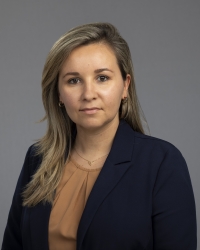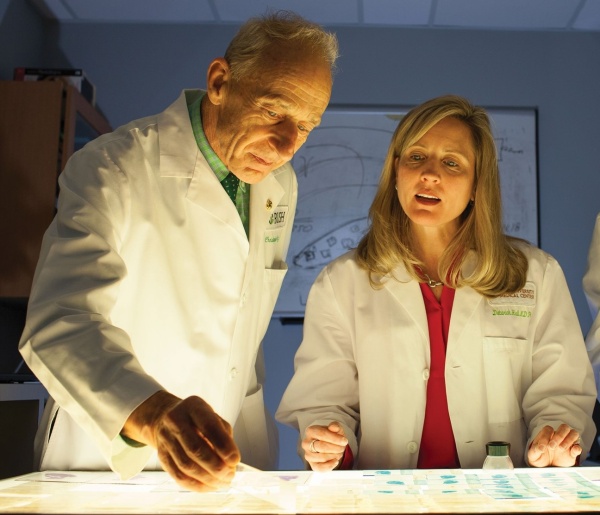
The Movement Disorders Research Committee at Rush University’s Parkinson’s Disease and Movement Disorder Program comprises multidisciplinary experts, including clinical and laboratory investigators, dedicated to ensuring the strategic effectiveness of research initiatives within the division. The committee plays a pivotal role in reviewing and approving research proposals for the Postma Grant, monitoring project progress, and offering guidance to investigators. Additionally, the committee contributes to the development and implementation of research policies, fosters interdepartmental and external collaborations, and actively promotes innovation and excellence in the field of movement disorders research.
The committee supports a strong emphasis on both clinical and translational research. Its clinical studies—ranging from observational to experimental trials—are designed to improve diagnostic methods, develop novel therapeutic strategies, and identify preventive interventions, ultimately enhancing patient care and health outcomes. Translational research within the program bridges the gap between bench and bedside, translating laboratory discoveries into clinical applications and vice versa—using clinical insights to guide fundamental research into disease mechanisms.
The overarching mission of the Rush Parkinson’s Disease and Movement Disorders Program is grounded in three pillars:
 Patient Care: Delivering comprehensive, personalized, and high-quality care across all stages of Parkinson’s disease and related movement disorders.
Patient Care: Delivering comprehensive, personalized, and high-quality care across all stages of Parkinson’s disease and related movement disorders. - Research: Conducting cutting-edge, inclusive studies leveraging the latest scientific and technological advances, with a focus on health equity and the social determinants of health.
- Education: Providing education and support to patients, families, healthcare professionals, and the broader community to improve awareness, management, and quality of life.
Research within the program encompasses a broad spectrum of neurological conditions, including Parkinson’s disease and related Parkinsonisms, Huntington’s disease, dystonia, Gilles de la Tourette syndrome and other tic disorders, fragile X-associated disorders, and various tremor conditions.
The program is nationally recognized and supported by multiple leading organizations. It is:
- Center of Care recognized by CurePSP
- Center of Excellence recognized by the Huntington’s Disease Society of America.
- Center of Excellence recognized by the MissionMSA.
- Center of Excellence recognized by the Parkinson’s Foundation.
- Center of Excellence recognized by the Tourette Association of America.
- Dystonic Study Group coordination center within the Dystonia Medical Research Foundation.
- Nationally recognized Fragile X-associated Disorders Center by the National Fragile-X Foundation
- Research Center of Excellence recognized by Lewy Body Dementia Association.
Additional funding is supported through government agencies, private foundations, and generous contributions from patients, families, and philanthropic donors.
The Rush University Parkinson's Disease and Movement Disorders Program offers a variety of research study opportunities ranging from clinical trials of new therapies, exercise studies, observational studies, survey/questionnaire-based opportunities, and clinical registries. Our studies cover many conditions, including Parkinson’s Disease, Dementia with Lewy Bodies, Multiple System Atrophy, Huntington’s Disease, Tourette’s Syndrome, and more. To learn more about studies that are actively recruiting, visit the Rush Clinical Trials website or speak with your Rush Movement Disorders healthcare provider.
-
Deborah A. Hall, MD, PhD, FAAN - Division Chief, Movement DisordersImage

Deborah A. Hall, MD, PhD, FAAN, Professor, conducts research in movement disorders doing both clinical trials and investigator-initiated studies. She has a NIH R01 looking at Racial Disparities in Parkinson’s disease She is investigating the bowel microbiome in Parkinson’s disease and REM sleep behavior disorder and has a focus on wearable technology use in the disease. She runs clinical trials in multiple system atrophy and progressive supranuclear palsy, including anti-protein immunotherapy infusions. She directs the Rush Huntington’s disease program and runs the largest observational study site for Enroll in Chicagoland. She conducts clinical trials in Huntington’s disease for new medications and is doing surgical gene therapy studies to try to slow progression of the disease. She is the director of the Fragile X-associated Tremor Ataxia Syndrome Clinic, one of the only of its kind in the country and is leading the development of rating scales and biomarkers for clinical trial readiness for the disease. She is committed to research across the institution as Vice Chair of Research for Neurological Sciences, Chair of the Rush Institutional Review Board, and mentor to many trainees and faculty on their research projects.
See the complete list of Dr. Hall's published work here.
-
Brandon Barton, MD, MSImage

Brandon Barton, MD, MS, Associate Professor with a joint appointment at Rush and the Jesse Brown Veterans Administration Hospital, is interested these major research areas: 1) Cognitive and psychiatric aspects of Parkinson’s disease specifically among US Veterans; 2) Pharmacology of Parkinson’s disease treatments; 3) Risk factors for Parkinson’s disease in US Veterans (such as TBI, PTSD, toxic exposures) and how they impact the presentation and symptoms of PD. He is working databases in the VA system to analyze the collected data of Veterans with PD. Many of the Rush patients are U.S. veterans, and they may benefit from the analysis of risk factors that predispose them to PD, and possibly lead to more specific treatments and evaluations in this sub-population of PD patients.
See the complete list of Dr. Barton's published work here.
-
Bryan Bernard, PhDImage

Bryan Bernard, PhD, Professor, has two main interests of research. He has studied the relationships of neuropsychiatric changes cognitive functioning in patients with Parkinson's disease. He has been involved in multi-year project of neuroimaging and cognitive functioning in Parkinson's disease funded by the NIH/NINDS. His other interes of study is an intervention of patients with Tourette syndrome. He is currently conducting a study of the applicability of a structured behavioral management program for children with Tourette syndrome.
See the complete list of Dr. Bernard's published work here.
-
Jori Fleisher, MD, MSCE, FAANImage

Jori Fleisher, MD, MSCE, FAAN, is an Associate Professor of Neurological Sciences at Rush University Medical Center. She is a movement disorders neurologist with a Master’s of Science in Clinical Epidemiology and additional post-graduate training in global health equities, palliative care, health services research, implementation research, and advocacy leadership. Dr. Fleisher’s primary research interests focus on improving the quality of life for individuals living with movement disorders today by designing novel models of care and caregiver support—at both the individual and healthcare system level. As the principal investigator of a novel, telemedicine-enhanced interdisciplinary home visit program for patient-caregiver dyads with advanced Parkinson’s Disease (PD), and creator of a novel caregiver peer mentoring intervention for PD- and Lewy Body Dementia (LBD) family caregivers, Dr. Fleisher is interested in the impact of these models on patient and caregiver health outcomes and dyadic resource utilization. She is also interested in modifications to expand and translate this work to other neurodegenerative conditions. Additional lines of research include the description of potentially modifiable barriers to optimal care, including health literacy, medication adherence, and caregiver burden in PD and other neurodegenerative conditions. Dr. Fleisher also studies the development, sustainability, and benefits of community-based exercise modalities for individuals with PD. Finally, Dr. Fleisher is interested in provider-patient communication and disparities in access to care, both in the United States and in low- and low-middle-income countries, as critical obstacles in the provision of neurologic care. Dr. Fleisher collaborates widely with colleagues across the US and world on studies related to PD, LBD, atypical parkinsonisms, and neuropalliative care. Her work has been funded by the National Institute of Neurological Disorders and Stroke, National Institute on Aging, Doris Duke Charitable Foundation, Parkinson’s Foundation, Davis Phinney Foundation, CurePSP, Parkinson Council, Parkinson Alliance, Feldstein Medical Foundation, institutional pilot grants, and private philanthropic funding
See the complete list of Dr. Fleisher's published work here.
-
David Andres Gonzalez, PhD, ABPPImage

David Andres Gonzalez, PhD, ABPP, Assistant Professor, is a clinical neuropsychologist and proponent of advanced analytics and “open science”. His primary line of research has focused on improving measurement of daily functioning, cognition, sleep, and emotional-behavioral symptoms in neurologic disorders. Most recently, this line of research has focused on technology, both as a method of assessment and tracking (e.g., wearables, remote/app-based cognitive assessment) and as its own domain of functioning (e.g., those who succeed in navigating technology can better engage in daily activities despite neurologic symptoms). His second line of research has focused on exploring the complex interplay of social connectedness and social determinants of health (e.g., neighborhood deprivation) on movement disorders. His third line of research applies insights from the first two lines to enact interventions that improve the cognitive, social, emotional, and functional health of individuals living with neurologic disorders. His work has been funded by the Parkinson’s Foundation, Alzheimer’s Association, National Institute on Aging, and institutional pilot grants. He also collaborates and consults with other researchers on assessment and data analytic approaches, as well as serving as an expert rater of cognitive-functional status and treatment response for various trials.
See the complete list of Dr. Gonzalez's published work here.
-
Aimee Karstens, PhDImage

Aimee Karstens, Ph.D., assistant professor, has research interests in innovative and digital cognitive tools, multicultural neuropsychology, modifiable and biological risk factors for cognitive decline and dementia (e.g., diet, APOE genotype), and nonpharmacological interventions in older adults with and without dementia. She is the co-principal investigator on a study adapting digital self-administered cognitive assessments for the Spanish language through the Mayo Test Drive web-based platform. Dr. Karstens is interested in using digital cognitive assessments and cultural adaptations to improve access to care, diagnostic sensitivity, and our ability to track cognitive outcomes in movement disorders.
See the complete list of Dr. Karstens's published work here.
-
Bryan Killinger, PhDImage

Dr. Bryan Killinger, PhD is an assistant professor in the Department of Neurological Sciences and co-director of the Rush Movement Disorders Brain Bank. He completed his postdoctoral training at the Van Andel Institute, where he investigated the role of epigenetics and gut-pathology for Parkinson’s Disease. Currently, Dr. Killinger’s lab is primarily involved in understanding the molecular mechanisms of alpha-synuclein aggregation in the brain of synucleinopathy patients. Specifically, his goal is to describe alpha-synuclein interactions within the human brain, and how those interactions evolve as synucleinopathy disease initiates and progresses. His lab specializes in several mass spectrometry-based proteomics techniques, including in situ proximity proteomics, which the Killinger lab pioneered for use in human synucleinopathy brain. Dr. Killinger’s lab is currently funded by the National Institutes of Health, the Michael J. Fox Foundation, and through generous donor support.
See the complete list of Dr. Killinger's published work here.
-
Alana Kirby, MD, PhDImage

Alana Kirby, MD, PhD, Assistant Professor, has a research interest in non-motor symptoms in movement disorders, and uses rodent models to better understand the contribution of brain circuits to these common and disabling symptoms. Dr. Kirby has an ongoing collaborative project with Dr. T. Celeste Napier in the Department of Psychiatry to investigate the effects of deep brain stimulation of the subthalamic nucleus on apathy in a rat model of Parkinson’s disease using cutting-edge optogenetic strategies. She is also the co-Director of the Rush Movement Disorders Brain Bank and Director of the Movement Disorders DNA and Video Repository.
See the complete list of Dr. Kirby's published work here.
-
Katie Kompoliti, MDImage

Katie Kompoliti, MD, Professor, is involved in research doing clinical trials and investigator-initiated studies. Her primary focus is on Tourette syndrome, Multiple System Atrophy and early Parkinson’s disease. She is currently involved in a study investigating ecopipam to treat tics in Tourette syndrome. She is also conducting studies to treat Neurogenic Orthostatic Hypotension, using ampreloxetine; and disease modification using an anti alpha-synuclein aggregation compound, in Multiple Systems Atrophy. She is participating in a study investigating disease modification in Parkinson’s disease using a tyrosine kinase inhibitor. Finally, she is involved in an investigator-initiated study, assessing the effects of videogaming on attention and conduct in children and adolescents with Tourette syndrome.
See the complete list of Dr. Kompoliti's published work here.
-
Matthew Meyers, MDImage

Matthew Meyers, MD, is an Assistant Professor in the Department of Neurological Sciences and the Department of Psychiatry and Behavioral Sciences. He completed a clinical fellowship in Behavioral Neurology & Neuropsychiatry and a post-doctoral fellowship in Clinical Pharmacology at Johns Hopkins University School of Medicine. Prior to that, he completed a residency in Adult General Psychiatry at Baylor College of Medicine and earned his M.D. at Rosalind Franklin University of Science and Medicine. His post-doctoral research focused on repurposing FDA-approved drugs for new indications. As part of this, he wrote an investigational new drug application for a first-in-human study of intradermal naloxone, and he served as a co-PI for the related clinical trial. His latest research examines the association between non-motor symptom severity and co-morbid REM Sleep Behavior Disorder and Neurogenic Orthostatic Hypotension in Parkinson’s disease. He plans to use a career development award to characterize this interaction further and establish related longitudinal biomarkers. This is part of his larger aim to understand the contribution of noradrenergic dysregulation to disease progression in alpha-synucleinopathies. Ultimately, his goal is to develop disease-modifying treatments that target the non-motor symptoms seen in the early stages of these diseases.
See the complete list of Dr. Meyers's published work here.
-
Joanne O'Keefe, PhDImage

Joan Ann (Joanne) O'Keefe, PhD, Associate Professor in the Department of Anatomy & Cell Biology at Rush University (with joint appointments in Neurological Sciences and Occupational Therapy). Her research focuses on the detection and underlying neural mechanisms of gait and balance impairments and their cognitive interactions in neurodegenerative movement disorders, including Fragile X-associated tremor/ataxia syndrome (FXTAS), a hereditary ataxia, Eseential tremor, Parkinson's disease, and Huntington's disease. Dr. O'Keefe is also the Rush University site PI for a Phase 3 multi-site RCT to study the impact of moderate or high intensity treadmill exercise on motor function longitudinally in persons with early-stage Parkinson's disease. Her lab seeks to advance non-invasive and non-pharmacological interventions for gait and balance impairments in movement disorders. Dr. O'Keefe has collaborated extensively with members of the Movement Disorder division in the Department of Neurological Sciences over the past 16 years. Dr. O'Keefe also participates in multiple clinical trials and natural history studies in Pediatric Neurology. Dr. O'Keefe's funding includes grants from the NIH, Department of Defense, and the Huntington's Disease Society Techniques performed in the O'Keefe lab, including:
- Inertial sensor-based measures of gait, balance, and tremor
- Functional cortical activity measurement via functional near infrared spectroscopy (fNIRS) during motor and cognitive tasks, and MRI measures of structural brain neurodegeneration
- Transcranial magnetic stimulation.
See the complete list of Dr. O'Keefe's published work here and here.
-
Neepa Patel, MDImage

Neepa Patel, MD, Associate Professor of neurological sciences and is the director of the Interventional Movement Disorders program. The two major areas of research focus are improving outcomes with Deep Brain Stimulation for movement disorders such as Parkinson’s disease, Essential Tremor and Dystonia and MRI guided Focused Ultrasound for tremors in Essential Tremor and Parkinson’s Disease and clinical trials to advance the treatment of Parkinson’s disease, Essential Tremor and Dystonia. Dr. Patel has worked to establish an interdisciplinary team for surgical therapy and establish guidelines within the program to optimize outcomes with Deep Brain Stimulation surgery. She is currently studying the characteristics of gait and balance changes associated with Essential Tremor.
See the complete list of Dr. Patel's published work here.
-
Samantha Patel, MDImage

Samantha Patel, MD, Assistant professor and co-director of Rush's Huntington's Disease Center of Excellence. Her research focuses on the characterization and treatment of social cognitive deficits in neuropsychiatric disorders, including but not limited to schizophrenia, Huntington's Disease, and Parkinson's Disease. In 2023, she was accepted to the American Psychiatric Association's Research Colloquium for Junior Psychiatrist Investigators. She received an Outstanding Poster Presentation award for her work on interventions for facial emotion recognition deficits in individuals with schizophrenia disorder. She is currently the principal investigator on a study examining the feasibility of a computerized social cognition intervention in individuals with Huntington's Disease.
See the complete list of Dr. Patel's published work here.
-
Christina Swan, MD, PhDImage

Christina Swan, MD, PhD, Assistant Professor, has research interests in the mechanisms of action of and clinical outcomes for deep brain stimulation for Parkinson’s disease. Her prior research has focused on understanding changes in brain signaling in Parkinson’s disease to define biomarkers for optimizing deep brain stimulation (DBS) therapy. She also has studied clinical outcomes in Parkinson’s disease for patients implanted via traditional awake surgery and via surgery under general anesthesia (“asleep” surgery). Asleep surgery uses new, high-resolution intra-operative imaging technology to target deep brain structures with high precision. Effective asleep implantation will allow for deep brain stimulation therapy to be brought to patients with symptoms too extreme to tolerate awake implantation. She is a principal investigator for tracking longitudinal clinical outcomes at Rush for patients implanted with Abbott DBS technology., assistant professor, has research interests in the mechanisms of action of and clinical outcomes for deep brain stimulation for Parkinson’s disease. Her prior research has focused on understanding changes in brain signaling in Parkinson’s disease to define biomarkers for optimizing deep brain stimulation (DBS) therapy. She also has studied clinical outcomes in Parkinson’s disease for patients implanted via traditional awake surgery and via surgery under general anesthesia (“asleep” surgery). Asleep surgery uses new, high-resolution intra-operative imaging technology to target deep brain structures with high precision. Effective asleep implantation will allow for deep brain stimulation therapy to be brought to patients with symptoms too extreme to tolerate awake implantation. She is a principal investigator for tracking longitudinal clinical outcomes at Rush for patients implanted with Abbott DBS technology.
See the complete list of Dr. Swan's published work here.
-
Michelle Tosin, PhD, MSNImage

Michelle Tosin, PhD, MSN, is an Assistant Professor at RUSH. She completed her PhD in Healthcare Sciences in Brazil and her post-doctoral at RUSH. She is the Director of International Relations of the Brazilian Academy of Nursing in Neurology and Neurosurgery (ABENEURO), Chairs the Critical Path for Rare Neurodegenerative Diseases (CP-RND) Huntington’s Disease Regulatory Science Consortium (HD-RSC) working group for the Clinical Outcome Assessments (COA), and the International Parkinson and Movement Disorders Society COA Scientific Evaluation Committee (MDS-COA-SEC). She is primarily interested in Clinimetrics, and, more recently, in Artificial Intelligence in Movement Disorders. She is the principal investigator of a study aimed at developing and validating a COA to assess the functional impact of psychosis in Parkinson’s Disease. The MDS sponsors this multicenter and international effort. She is also the principal investigator at Rush of a study to assess the correlation between oculometric measures captured by AI and clinical assessment in patients with Idiopathic Parkinson's Disease (PALOMA trial). The NeuraLight Inc. sponsors this multicenter and international effort. Upcoming plans will focus on further international collaborations for assessing and managing medication adherence in Parkinson's Disease, combining standardized COA and AI.
See the complete list of Dr. Tosin's published work here.
-
Pierpaolo Turcano, MDImage

Pierpaolo Turcano, MD, Assistant Professor, was born and raised in Italy, where he obtained his medical degree from University of Pisa. He then moved to the United States after graduation, where he worked as a researcher for three years in the Movement Disorders Division at Mayo Clinic. His area of research mainly focuses on understanding the cause of Parkinson’s disease, with the aim to provide better quality of care for his patients, particularly those who develop Parkinson’s disease at a young age. He completed both his neurology residency and Movement Disorders fellowship at Mayo Clinic. He is an Assistant Professor of Neurological Sciences within the section of Movement Disorders at Rush University Medical Center.
See the complete list of Dr. Turcano's published work here.
-
Devin Ulrich, PhDImage

Devin Ulrich, PhD, Assistant Professor, is a clinical neuropsychologist at Rush University Medical Center. Her research has primarily focused on 1) neural and environmental correlates of personality/psychiatric disorders and health outcomes across clinical populations and 2) performance and symptom validity testing for neurocognitive and psychological evaluations. Most recently, this research has focused on examining the impact of adverse childhood experiences and other social determinants of health (e.g., neighborhood resource deprivation, health literacy) on health outcomes for patients with neurologic disorders. A second line of research has focused on performance and symptom validity testing in clinical populations. Finally, she has a burgeoning interest in brief psychotherapeutic interventions and how they can improve both physical and mental health outcomes for patients with neurological disorders.
See the complete list of Dr. Ulrich's published work here.
-
Cynthia L. Comella, MD - Professor EmeritusImage

Cynthia L. Comella, MD, Professor Emeritus, focuses on two major areas of research. She has been interested in Parkinson's disease clinical trials. She conducted clinical trials in the disease focused on patients in the moderate stages with motor fluctuations. Her second focus was in the area of dystonia, where she is an international leader. She led an NIH-funded project to describe dystonia and create rating scales for the disorder. She has led many studies related to dystonia, with interest in new formulations of botulinum toxins and medications for patients who are not candidates for toxin. In the coming years, her goal is to provide mentorship and guidance to the younger group of movement disorders specialists and to remain active in the field.
See the complete list of Dr. Comella's published work here.
-
Christopher G. Goetz, MD - Professor EmeritusImage

Christopher G. Goetz, MD, Professor and Director of the Strategic Program Growth is primarily interested in studying hallucinations, abnormal movements termed dyskinesia and rating measures to assess movement disorders. He is the former President of the International Parkinson and Movement Disorders, and he continues to serve leadership roles in this internal organization. He is the director of a global program to translate key rating scales for Parkinson's disease in multiple languages so that these scales can be used across global cultures. He has led efforts to study visual hallucinations in Parkinson's disease, a core problem facing many patients, and with the application of new neuroimaging techniques, he has studied the anatomical basis of these phenomena.
See the complete list of Dr. Goetz's published work here.
-
Glenn Stebbins, PhD - Professor EmeritusImage

Glenn Stebbins, PhD, is a Professor Emeritus in the Movement Disorders Section of the Department of Neurological Sciences at Rush University Medical Center, Chicago, Illinois. He graduated from San Francisco State University with a bachelor's degree in psychology and completed his doctorate in clinical psychology at the University of Arizona. Dr. Stebbins did his internship in clinical neuropsychology at Rush University Medical Center where he also completed his post-doctoral fellowship. He is an active member in the International Parkinson and Movement Disorder Society, serving on numerous committees, task forces, and study groups. He served as the Co-Chairperson of the MDS Clinical Outcome Program for five years and oversaw the development and implementation of multiple assessment tools owned by the Society. Dr. Stebbins serves as advisor to the Michael J. Fox Foundation for Parkinson's Research, CHDI Foundation, Critical Path for Parkinson's Consortium, Huntington's Disease Regulatory Science Consortium, and multiple industry partners. He has served on the National Institute of Neurological Diseases and Stroke Parkinson's Disease Common Data Elements Task Force and the Huntington's Disease Common Data Elements Task Force. He has been awarded funding from the National Institute on Aging, National Institute of Neurological Diseases and Stoke, Office of Naval Research, Department of Defense, and multiple non-profit and for-profit entities. Dr. Stebbins has also served on the study sections for the National Institute of Health, Veterans Administration, Michael J. Fox Foundation, and Alzheimer's Association grant reviews. His academic focus is on the development, validation and implementation of clinical outcomes used in the assessment of movement disorders, with a specific focus on Parkinson's disease, Huntington's disease, and dystonia. Dr. Stebbins has lectured internationally and is the author or co-author of more that 200 peer-reviewed articles, reviews, research papers, books and book chapters.
See the complete list of Dr. Stebbins's published work here.

Your support helps RUSH advance research, treatment, and overall quality of care, making a direct impact in the lives of people living with Parkinson's Disease and other movement disorders as well as their care partners. Donor support drives research forward. Thank you for your ongoing partnership.
Image

| Image

| Image

| Image

|
Image

| Image

| Image

|
